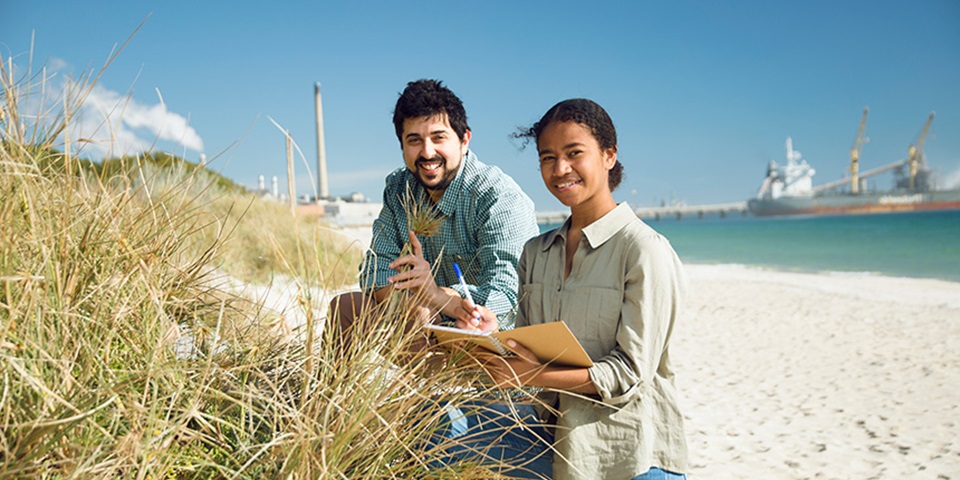News
Why study Environmental and Conservation Sciences at Murdoch?

Who will solve our most complex environmental challenges? Passionate people just like you. Learn more about Murdoch University’s innovative environmental school.
Are the environmental sciences are calling to you?
Is being immersed in nature when you feel your most authentic self? Do you feel most connected to the planet when you hear the sound of the ocean or birds and insects in the forest, smell the sea air or Eucalyptus leaves crushed underfoot or perhaps just being surrounded by this ancient land that makes Australia so unique. Or maybe you’re someone who’s ready to launch into passionate problem-solving mode when you read about dwindling wildlife populations and fields of plastic in our oceans?
For all of us at the School of Environmental and Conservation Sciences, we live and breathe this passion through teaching with enthusiasm, researching the most pressing issues, engaging in lifelong learning, and inspiring the next generation of environmental professionals and scientists.
What are environmental and conservation sciences?
Ecosystems are always changing, naturally. However, under constant and widespread human influence they are changing at unprecedented rates.
Our discipline aims to develop real-world solutions to protect our natural resources, biodiversity and ecosystems, whilst supporting humans to coexist with and conserve the planet that provides them. A degree in Environmental and Conservation Sciences equips students with the knowledge and experience necessary to confront challenges on a local, national and international level.
A day in the life of an Environmental and Conservation Sciences student
Each day will be an adventure. On any given day, you might:
- Brainstorm innovative conservation ideas with classmates.
- Prepare for a morning of weighing, measuring, and recording data about this morning’s catch – monitoring quenda right here on campus!
- Zip up a wetsuit, ready for a morning on the water at the Coral Bay field research camp.
- Raise the sails on a tall ship to chase the Leeuwin current.
- Discuss ethics in science with your fellow students and lecturers.
- Contribute to real-world research projects on campus.
- Get goosebumps considering the vast expanse of the ocean we have yet to explore.
- Write an assignment on an issue that you’ve been curious about since childhood.
- Explore our woodlands and wetlands, learning how threatened black-cockatoos and snake-necked turtles are getting by in the human world.
Does this list leave you wanting more? This could be the start of your journey into a highly-respected field that seeks scientific professionals with fresh ideas and passion for unique biodiversity. Read about your career options.
The Murdoch difference
We’re working towards a brighter future for all, just as we’ve done for the last half-century. Your career in this future-focused industry requires practical training with modern equipment in a real-world setting.
Field trips
The opportunity to take your learning into the big wide world:
- Ecology students spend a fun week in Albany, engaged in plant and animal projects.
- Marine Biology students visit Point Peron in the summer learning about coastal marine biodiversity, habitats and ecology.
- Tropical Marine Biology students head to Coral Bay and Ningaloo in the winter for group-based research projects.
- Wildlife Biology students will be part of a campus research project with quenda, or at Yanchep National Park to survey frogs, reptiles and small mammals.
- Nature-based tourism students take day trips to some of Perth’s most popular wildlife and wildflower tourism sites.
Natural laboratories
At Murdoch, you’ll not only learn in state-of-the-art teaching laboratories, but also in our campus’s bushland and wetland surroundings. We have two conservation category wetlands, a banksia woodland, turtles, quendas, threatened black-cockatoos, and more than 200 species of plants. We also have a suite of marine protected areas and ecosystems on our doorstep.
Chris’s double major has him studying on land and sea.
Beyond the classroom
Consider these opportunities:
- Scholarships. For example, there is the New Colombo Plan which offers the opportunity to take an internship in the Indo-Pacific region for up to 18 months.
- Work placements. You could be on projects and campaigns with a community group, private organisation, NGO, or government agency.
- Study exchange. Push yourself out of your comfort zone and study relevant units at one of our partner universities for one or two semesters.
- Involvement. We encourage students become involved in research, volunteering, and other activities that promote environmental awareness and sustainability.
Choose your adventure: which major will you pick?
The world is your oyster, so they say. There are endless opportunities in nature’s playground, and those opportunities are growing exponentially. Our Bachelor of Science (Environmental and Conservation Sciences) has three majors depending on what specialisation you’d like to focus on: Conservation and Wildlife Biology, Environmental Science and Management, or Marine Biology.
Want to know more about our outstanding school? Find out here.
Your future awaits
We were one of the first universities in Australia to establish a School of Environmental Science – an entirely new discipline in the 1970s. We were the first Western Australian university to sign the United Nations’ Sustainable Development Goals, and we also aim to be a recognised centre of excellence at the newly-established Harry Butler Institute. We’re committed to our bold and progressive goals in environmental science – will you join us on our journey towards a brighter, more liveable planet for all?
Discover the exciting opportunities at the School of Environmental and Conservation Sciences.
News
Why study Environmental and Conservation Sciences at Murdoch?
Posted on
Topics